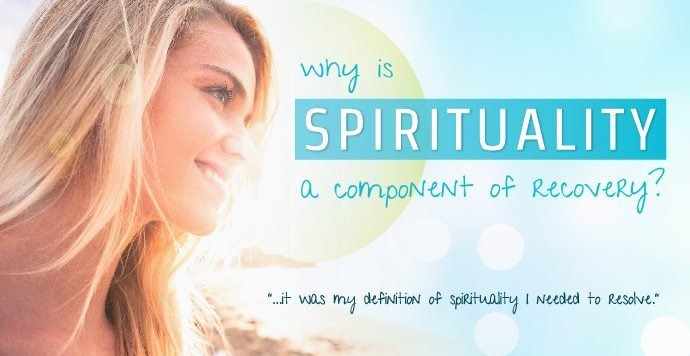Why Spirituality Is A Component Of Recovery?

The world used to be a magical place.
When I was a kid, magic was everywhere. I was a dreamer; I used to make up scenarios of fantasy-like stories when I was riding in the back of the car staring out the window, or any time I found myself in the in-between times—even in the classroom, where I thought the teacher’s topic was far less interesting than imagining myself in outer space having a conversation with angelic, giant purple aliens.
Our family went to a little suburban mainstream church on Sundays. I didn’t mind going, I suppose. However, I think why I didn’t react the same way other kids my age did was simply because it was another opportunity to daydream. Some of the theology stuck, no doubt, but I wouldn’t have equated “church” with “spirituality.”
Stories were the one thing that could capture my wandering attention. It didn’t matter if the story was in the form of a book, a movie, or even a campfire tale. I loved stories, because they got me outside myself. Although I’ve managed to develop the ability to focus enough to complete more mundane tasks adulthood requires, I never lost my love of stories.
But something changed when I matured: the world wasn’t as magical anymore.
Everyday worries and responsibilities that plague adulthood (and quash childlike playfulness or dreaminess) seemed to invade my consciousness. Anxiety, an inescapable and grinding annoyance, ruled from the time I got up to when I lay down to sleep.
Avoiding stress and anxiety became a full time job . . . until I rediscovered the magic.
Drugs and alcohol helped me recapture childhood’s dreamy wizardry.
Many addicts or alcoholics in recovery recall a similar experience when they remember using their drug of choice for the first time: it’s as if a veil is lifted, and they get back all they lost the moment the drugs kick in.
When an addict first uncovers how a drug feels, they want to keep going back to that place, because it fills a gaping hole in their soul unlike anything else. Using drugs or drinking is damn convenient too; because it’s in the form of a pill or a drink, all you need to do is imbibe or shoot it into your system and… voilà, you’re there.
The magic of drugs or alcohol is that they work… well, at first anyway. People who don’t use or drink (or if they do so “normally”) never understand this point—we used drugs and alcohol because they did something positive for us! If they didn’t, we wouldn’t have gone down that path; we’re not idiots, after all.
The hard part about drugs or alcohol is that they quit working as effectively as they first did.
And they cause a whole host of other problems.
The difficulties drugs or alcohol cause are usually what gets a person into rehab. As an addict or alcoholic who is suffering, you’re seeking a solution to the barriers you’ve encountered.
This certainly was my experience the multiple times I’ve had to go to treatment: I wanted to stop the pain. Before the last treatment finally stuck, the pain had reached a point where life became unbearable. I just wanted all the agony to stop.
However, I got a surprise when I entered rehab.
There I was, expecting a medical and scientific solution to my problem. Instead, I found myself sitting in a circle of other patients, and we were discussing something that seemed to have nothing to do with my problem—we were talking about spirituality!
I remember thinking that I felt like I had been ripped off—I wanted treatment for addiction, not some weird cult!
Depending on which treatment rehabilitation center a person selects, many of those organizations still use a Twelve-Step modality to approach addiction.
Despite your feelings toward Twelve Step recovery, the approach still dominates the recovery landscape. Some states even require mandatory attendance to a group like AA or NA for law-involved clients.
In my personal case, I’ve grown to appreciate the advantages the Twelve Steps offers for me, and at least tolerate some of the attitudes or quirky traditions any one specific group may follow. After five years of continued sobriety, I can say that—for me—it seems to work.
A commonality that all Twelve Step groups share is the need to address addiction with a spiritual solution.
At first, I thought this was really weird. Bizarre even. Here my counselors—even my health insurance company—were telling me that I had a disease, but that to treat that disease I needed . . . spirituality?
The solution to the problem didn’t seem to mesh.
What I found later on is that it was my definition of spirituality I needed to resolve.
All my life, I had thought that spirituality equals church; that church deals with the highly personal subject of all things spiritual. What I found out is that spirituality, instead, was a way of living that recaptured my dreaminess I had lost as a child.
For me, spirituality is finding peace and purpose to life. For me, personally, my church participation fills part of that. However, spirituality is something much more expansive than simply theological beliefs or practices. Spirituality is about addressing the very real-world difficulties that life has to offer instead of hiding behind the fantasy world drugs seemed to provide.
I’ll never go back to being a kid again. I’m okay with that. I live in the world of adults. I have adult responsibilities like cleaning my toilet, paying my bills, or taking my kids to school. Before, when I still used, I tried to run away from these responsibilities, or at least hide in an alcoholic fog in the evening to “unwind.”
Now, after regaining a spiritual center, I center my life not in my own perceived needs. Instead, I focus the work I do to share my story of depression and addiction, and the hope of recovery. Spirituality, for me, is simply taking the time to re-center my life around my purpose to heal others, and to be of service.
As a writer, I get the chance to live my purpose sometimes in wildly creative ways, like writing a comic book sharing the new life I’ve found.
As a parent, I get the chance to take my boys to school without a hangover.
As a husband, I get the chance to cook dinner with my wife, without having first to go in the bathroom and take pills.
The reason why Twelve Step recovery addresses spirituality, is because the founders were interested in giving its participants the ability—once again—to function as human beings.
Of course, there are other modalities to treatment. Each person has to go with what works for them.
However, my hope in writing this short piece is that you’ll see spirituality not so much as a scary, cultish, weird way to deal with your problems, but instead as simply a new way of looking at the world, and one that has worked for millions of people in the United States and abroad.
It doesn’t work for everyone, but it’s worked for me. And because of a renewed spirituality, every once in a while I get to be a bit of a kid again and conjure up the magic I thought I had lost.
Daniel D. Maurer is a freelance writer openly living in long-term recovery. He is the author of Sobriety: A Graphic Novel, a Hazelden Publishing, youth and young adult resource. Daniel is currently working on his fourth book, which covers the topic of resiliency. He lives with his family in Saint Paul, Minnesota.
Daniel D. Maurer Website - Transformation Is Real




